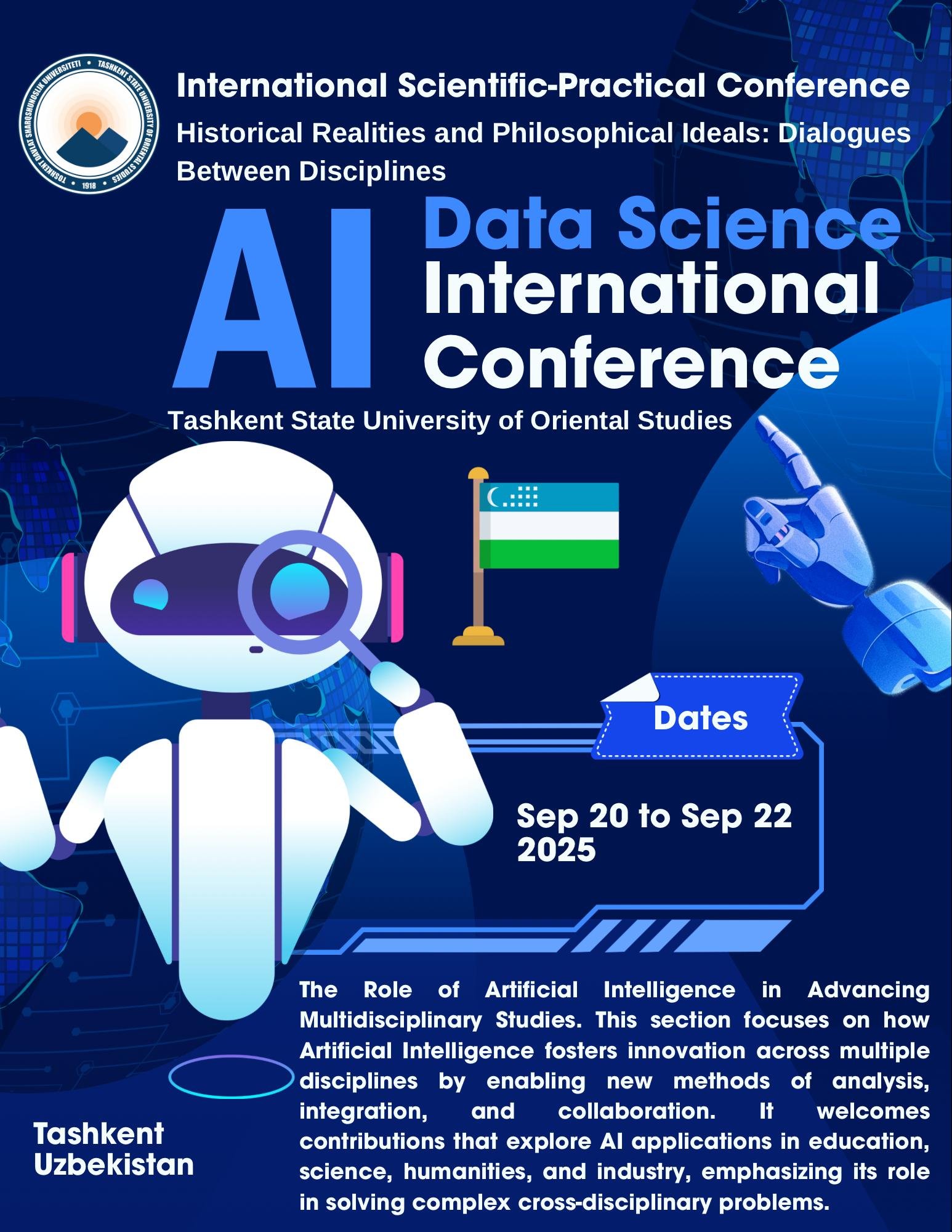Copyright Statement Conference Proceedings Archives Focus and Scope Conference Processes Open Access Statement Plagiarism Policy
Current Issue

Key Points of the Conference Platform
-
Official Source for Conference Information
Centralized platform for all national and international conferences hosted by Tashkent State University of Oriental Studies (TSUOS). -
Transparent and Timely Communication
Provides official announcements, important dates, and real-time updates related to each conference. -
Comprehensive Coverage
Offers detailed information on conference programs, keynote sessions, academic panels, and speaker profiles. -
Open Access to Conference Materials
All research papers, reports, and post-conference outcomes are made freely available under a Creative Commons license. -
Supports Global Academic Exchange
Encourages participation from scholars and researchers worldwide, fostering intercultural and interdisciplinary collaboration. -
Post-Conference Highlights
Publishes summaries, visual content, and analytical reflections on the academic impact of each event. -
Promotion of Oriental Studies
Strengthens global understanding and research in Oriental Studies through scholarly dialogue and innovation. -
Dual Format Participation
Supports both online and in-person attendance, allowing flexible access for all participants. -
Inclusive and Scholarly Environment
Welcomes contributions across disciplines with a focus on quality, originality, and relevance to the conference theme.
Current Conference

Purpose and Objectives of the Conference:
The conference aims to explore the importance of interdisciplinary research in the study of sources related to the culture, history, philosophy of Eastern civilizations, and Role of Artificial Intelligence in Advancing Multidisciplinary Studies. Particular emphasis will be placed on the theoretical and practical dimensions of ethnology, anthropology, and the contemporary political dynamics of Eastern societies.
The event will bring together leading scholars in Oriental studies, history, source studies, Technology and philosophy from both domestic and international academic institutions. The conference also welcomes the participation of university professors, early-career researchers, doctoral candidates, and independent scholars engaged in studies on world history, the evolution of socio-political institutions, Artificial Intelligence in Advancing Multidisciplinary Studies and processes, and international relations.
The conference will be conducted across the following thematic sections:
1. Theoretical and Practical Issues of Interdisciplinary Approaches in Historical Research. Focused on methodological innovations and challenges in applying interdisciplinary frameworks to the study of historical phenomena.
2. Global History: The Interconnected Development of Eastern Regions. Exploring transregional influences, shared developments, and historical interactions among Eastern societies within the global context.
3. Current Issues in Historical Source Studies and Historiography. Examining the latest trends, debates, and methodological concerns in the analysis and interpretation of historical sources.
4. The Importance of Interdisciplinary Research in the Study of Tangible and Intangible Cultural Heritage. Addressing cross-disciplinary approaches to documenting, preserving, and analyzing cultural traditions, artifacts, and practices of Eastern civilizations.
5. Key Directions in Eastern Philosophy and Culture. Discussing philosophical schools, cultural paradigms, and intellectual traditions that have shaped and continue to influence Eastern thought.
6. The Role of Artificial Intelligence in Advancing Multidisciplinary Studies. This section focuses on how Artificial Intelligence fosters innovation across multiple disciplines by enabling new methods of analysis, integration, and collaboration. It welcomes contributions that explore AI applications in education, science, humanities, and industry, emphasizing its role in solving complex cross-disciplinary problems.


